
Select users were given early access to the chatbot, and they have not been shy about sharing their experiences. Many of these users tested the chatbot’s capabilities and exposed its flaws, which were many.
From revealing its confidential codename used internally by developers, to declaring its love to a New York Times writer and asking him to leave his wife, to wishing it was alive, the chatbot was acting out of hand.
Also: Why open source is essential to allaying AI fears, according to Stability.ai founder
Consequently, Microsoft reeled in the chatbot with a new session limit, changing chat sessions from an unlimited session to a five-question limit, and a 50-chat turn limit per day. That limit was then expanded to six chat turns per session and 60 total chats per day, still less than the original experience users got.
Microsoft notes that convoluted, long chat sessions were not something it was testing for internally, so the public’s use and feedback has actually been useful in learning more about the chatbot.
“In fact, the very reason we are testing the new Bing in the open with a limited set of preview testers is precisely to find these atypical use cases from which we can learn and improve the product,” says Microsoft.





















